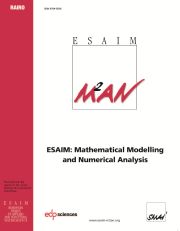Crossref Citations
This article has been cited by the following publications. This list is generated based on data provided by Crossref.
Calaque, Damien
Ebrahimi-Fard, Kurusch
and
Manchon, Dominique
2011.
Two interacting Hopf algebras of trees: A Hopf-algebraic approach to composition and substitution of B-series.
Advances in Applied Mathematics,
Vol. 47,
Issue. 2,
p.
282.
Lundervold, Alexander
and
Munthe-Kaas, Hans
2013.
Backward Error Analysis and the Substitution Law for Lie Group Integrators.
Foundations of Computational Mathematics,
Vol. 13,
Issue. 2,
p.
161.
Ebrahimi-Fard, Kurusch
and
Manchon, Dominique
2014.
The Magnus Expansion, Trees and Knuth’s Rotation Correspondence.
Foundations of Computational Mathematics,
Vol. 14,
Issue. 1,
p.
1.
Ebrahimi-Fard, Kurusch
and
Manchon, Dominique
2014.
The tridendriform structure of a discrete Magnus expansion.
Discrete & Continuous Dynamical Systems - A,
Vol. 34,
Issue. 3,
p.
1021.
McLachlan, Robert I.
Modin, Klas
Munthe-Kaas, Hans
and
Verdier, Olivier
2016.
B-series methods are exactly the affine equivariant methods.
Numerische Mathematik,
Vol. 133,
Issue. 3,
p.
599.
Auzinger, Winfried
Herfort, Wolfgang
Koch, Othmar
and
Thalhammer, Mechthild
2017.
Lie Groups, Differential Equations, and Geometry.
p.
71.
Casas, Fernando
Chartier, Philippe
Escorihuela-Tomàs, Alejandro
and
Zhang, Yong
2021.
Compositions of pseudo-symmetric integrators with complex coefficients for the numerical integration of differential equations.
Journal of Computational and Applied Mathematics,
Vol. 381,
Issue. ,
p.
113006.

